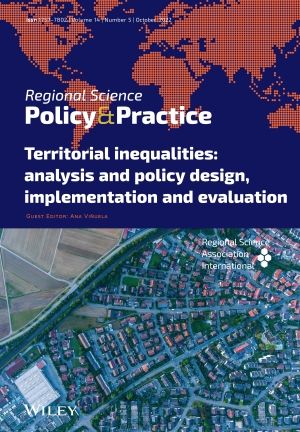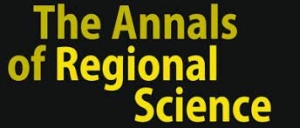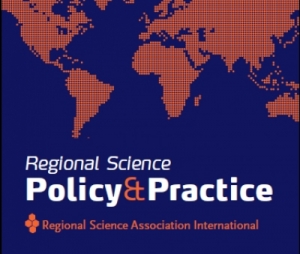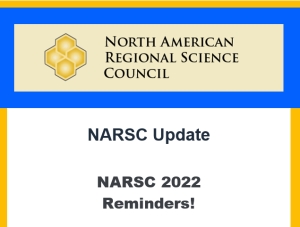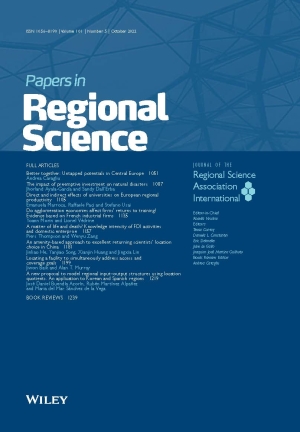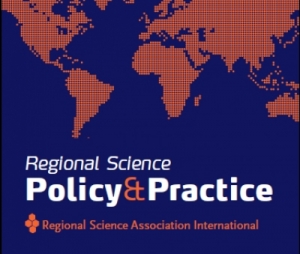Archives
Elisabete Martins
The latest issue of Regional Science Policy & Practice are available! Volume 14, Issue 5, October 2022
|
Regional Science Policy & Practice Pages: 1029-1247 October 2022 Issue Edited by: Ana Viñuela |
ISSUE INFORMATION
![]() Free Access
Free Access
Pages: 1029-1030 | First Published: 18 October 2022
INTRODUCTION
Territorial inequalities: Analysis and policy design, implementation and evaluation
Ana Viñuela
Pages: 1031-1033 | First Published: 18 October 2022
ORIGINAL ARTICLES
![]() Open Access
Open Access
Regional economic disparities, spatial dependence and proximity structures
Alfredo Cartone, Domenica Panzera, Paolo Postiglione
Pages: 1034-1050 | First Published: 01 October 2021
![]() Open Access
Open Access
Paul Cairney, Sean Kippin, Emily St Denny, Heather Mitchell
Pages: 1051-1061 | First Published: 31 August 2021
Cohesion policy evaluation: Guidelines for selection of appropriate methods
Panagiotis Koudoumakis, George Botzoris, Angelos Protopapas
Pages: 1062-1084 | First Published: 09 March 2022
Developing a methodological framework for capturing regional disparities in social development
Fathim Rashna Kallingal, Mohammed Firoz C
Pages: 1085-1112 | First Published: 03 August 2022
From impact assessments towards proactive citizen engagement in EU cohesion policy
John R. Moodie, Viktor Salenius, Michael Kull
Pages: 1113-1132 | First Published: 08 September 2021
![]() Open Access
Open Access
Au revoir Paris! Spanish regions closer to the EU average and further away from the leaders
Alicia Gómez-Tello, María-José Murgui-García, María-Teresa Sanchis-Llopis
Pages: 1133-1157 | First Published: 11 November 2021
Zbigniew Mogila, Patricia C. Melo, José M. Gaspar
Pages: 1158-1187 | First Published: 15 December 2021
Jaime A. Prudencio-Vázquez, Esteban Fernandez Marquez, Fernando Rubiera Morollón
Pages: 1188-1200 | First Published: 08 July 2021
Dina Krasnoselskaya, Venera Timiryanova
Pages: 1201-1222 | First Published: 07 February 2022
![]() Open Access
Open Access
Masni Mat Dong, Peter Midmore, Maria Plotnikova
Pages: 1223-1239 | First Published: 26 January 2022
BOOK REVIEWS
Dalin Janpathompong, Sutee Anantsuksomsri, Nij Tontisirin
Pages: 1240-1241 | First Published: 03 July 2022
Handbook of megacities and megacity‐regions edited by Danielle Labbé and André Sorensen Edward Elgar, 2020. $278.00, hardback, xv, 425 pp., ISBN 978‐1‐78897‐269‐7. E‐book, https://doi.org/10.4337/9781788972703
Gordon F. Mulligan
Pages: 1242-1247 | First Published: 30 July 2022
Assistant Professor Position, Quantitative Methods in Spatial Analysis
Title: Assistant Professor, Quantitative Methods in Spatial Analysis
Location: Department of Agricultural Economics, College of Agriculture, Purdue University, West Lafayette, IN, USA
Principal Duties: The Department of Agricultural Economics is seeking an academic-year tenure-track faculty member to develop a nationally-recognized program of scholarly research and teaching in quantitative methods in the area of spatial econometrics.
The successful applicant will contribute to the development and application of frontier quantitative tools in spatial econometrics used across the Department’s areas of strength, including agribusiness, health, international trade and development, industrial organization and supply chain, and environment, natural resources and climate. Teaching responsibilities for the position include graduate training in spatial analysis and econometrics, as well as the opportunity to develop other course(s) in quantitative techniques for graduate and undergraduate students. Potential exists for teaching distance courses. The successful candidate is expected to conduct scholarly research employing frontier quantitative methods, publish in high-impact peer reviewed journals, mentor graduate students, and secure external funding to support their research program.
The successful candidate will have the opportunity to conduct research in collaboration with five dynamic centers housed in the Department in the areas of agribusiness, commercial agriculture, international trade, and rural development, as well as with the University- wide, interdisciplinary centers of excellence in regional development (Purdue Center for Regional Development), healthcare (Regenstrief Center for Healthcare Engineering), env/climate (Purdue Institute for a Sustainable Future), and sustainable transportation (Sustainable Transportation Systems Research Group).
The successful candidate should have a PhD in Agricultural and Applied Economics, Economics, or another closely related field by August 2023; demonstrate potential for scholarly excellence in frontier quantitative spatial analysis; a commitment to teaching excellence; high potential for securing extramural funding; and capacity to teach and mentor students to advance the mission of the Department of Agricultural Economics and College of Agriculture.
Salary and Benefits: Salary is competitive and commensurate with education, training, and professional experience. An excellent fringe benefit package includes a retirement program, medical, and life and disability insurance.
The Department: The Department of Agricultural Economics at Purdue University has 38 tenure track faculty, over 450 undergraduate students across four majors, and over 100 graduate students. The department’s research and education activities are conducted on a wide array of issues that include agribusiness management, sales, experimental economics, industrial organization, decision sciences, development, trade, policy, macroeconomics, production, consumption, and environmental and resource issues.
The College: The Department of Agricultural Economics is an integral part of the College of Agriculture, one of the world’s leading colleges of agricultural, food, life, and natural resource sciences and ranked eighth in the world in the 2022 QS World University Rankings. The College is deeply committed to the three land-grant missions (teaching, research, and extension), to international activities and perspectives that span all missions, and to excellence in all we do. The College has 11 academic departments and includes 302 faculty, 2823 undergraduate students, and 769 graduate students. The College’s current strategic plan can be accessed at https://ag.purdue.edu/about/strategic-plan.html.
Application and Materials:
Applying for this position is a two-step process.
- Candidates must submit materials to https://econjobmarket.org/positions/8678
- Candidates must provide their name and upload their CV at: https://careers.purdue.edu/job-invite/22357/
Applications must include
1.) Cover letter that speaks to the candidate’s qualifications for and interests in the position as described herein with contact information,
2.) C.V.,
3.) Diversity and inclusion statement explaining how the candidate’s teaching, scholarship, and mentoring, has helped or will help to foster and advance diversity, equity, and inclusion in the department and the college, 4.) Statement of research interests and future research direction,
5.) Teaching statement,
6) A list of three professional references with contact information.
Purdue University’s Department of Agricultural Economics is committed to advancing diversity in all areas of faculty effort, including discovery, instruction and engagement. Candidates should address at least one of these areas in a separate Diversity and Inclusion Statement, indicating their past experiences, current interests or activities, and/or future goals to promote a climate that values diversity and inclusion.
Purdue University, the College of Agriculture, and the Department of Agricultural Economics are committed to free and open inquiry in all matters. Candidates are encouraged to address in their cover letter how they are prepared to contribute to a climate that values free inquiry and academic freedom.
Screening of applicants will begin on November 1, 2022 and will continue until the position is filled. A background check is required for employment in this position. For additional information contact Tracy Buck at This email address is being protected from spambots. You need JavaScript enabled to view it.
Purdue University is an EOE/AA employer. All individuals, including minorities, women, individuals with disabilities, and veterans are encouraged to apply.
WRSA: Call for Papers - "Special Centenary Issue: Charles M. Tiebout" in The Annals of Regional Science
Dear WRSA Members and Friends,
The official journal of WRSA, The Annals of Regional Science, is calling papers for a special issue in honor of Charles M. Tiebout (1924-1968). This special issue is to mark the centenary of his birth.
The emphasis of this special issue is not about Charles Tiebout per se, but rather on exemplary research that best exemplifies the continuing relevance of his work for contemporary scholarship.
This special issue is being co-edited by Professors Steven Craig, Eric Heikkila, and Geoffrey Hewings.
To be considered for this special issue, papers should be submitted through the ARS portal no later than April 15th, 2023. Authors contemplating a contribution are encouraged to send a one-paragraph abstract to This email address is being protected from spambots. You need JavaScript enabled to view it. early on in the process for a preliminary assessment of fit.
Please find the attached "Call of Papers" for more details.
Western Regional Science Association
62nd Annual Meeting of WRSA, Big Island, Hawaii (Feb 15-18, 2023)
Dear PRSCO Members and Friends,
This is a friendly reminder about the extended paper submission due for the 2023 WRSA Annual Meeting in the Big Island of Hawaii.
This year's FINAL deadline will be November 30. Be sure to get your paper submitted before then!
Remember that the hard deadline for the Graduate Students' Paper Competition for Tiebout Prize is still October 15. If you are applying for Tiebout Paper Competition, submit your full paper by October 15.
Ready to submit? There's no reason to wait until the last minute. Simply visit the WRSA website and use the Login/Register link at the left to upload your paper and register for the meeting.
I also encourage you to make your travel arrangements early. We will be meeting at the n Hilton Waikoloa Village in the Big Island of Hawaii, where our negotiated room rate is $239 plus applicable taxes and a $15 resort fee (reduced from $45 for our group). Reservations can be made via this link or you can make a reservation by calling 808-886-1234 and asking for the Western Regional Science Association 2023 group rate. The hotel has agreed to honor our special room rate three days prior to and three days following our meetings (Feb 12th through Feb 20th), based on availability.
Please note: after January 13, 2023, or as soon as our room block is full, the hotel will no longer honor our special room rate! Be sure to book early!
I'm also still looking for several students to assist with meeting registration in Big Island, Hawaii. In exchange for 8-10 hours of volunteering at the registration desk, students will receive a complete rebate of their preregistration fees (worth $150, to be processed as a refund following the meeting). Contact me if you're interested.
RSPP Call for Papers | Special Issue on Regional and urban economic modeling
Call for papers for RSPP Special Issue on
“Regional and urban economic modeling”
The aim of Regional Science Policy & Practice - RSPP is to promote and diffuse the understanding of human interaction in space; based on sound, rigorous and up-to-date methodologies; and focusing on real and urgent issues for peoples and places, that require adequate policy responses.
The Covid-19 pandemic has been attracting the focus of both economists and policy makers in the last few years. This resulted in a huge number of papers related to different aspects of Covid-19 and its socio-economic impacts. Yet, recent months have brought new challenges that may influence local and regional economies. The Russian aggression in Ukraine not only led to energy and food crisis worldwide but also caused a significant increase in prices. This in turn may result in global economic slowdown that is likely to increase existing regional inequalities.
This call aims to mobilize publications that model the state of local and regional inequalities, analyse regional development strategies and possible policy responses to the challenges that are likely to appear in the next few years. We kindly invite contribution on topics related (but not limited) to:
- The impact of Covid19 on regional economic growth and development
- Spatial inequalities
- Infrastructure, transport flows and networks among regions
- Regional Input-Output (IO) and Computable General Equilibrium models (CGE)
- Tourism and regional development
- Migration and regional labor markets
- Innovation policies
- Spatial externalities and their role in regional development
- Competition and cooperation at local and regional level
We welcome original, unpublished papers that address the above questions, or any other research questions not mentioned, as they relate to the regional and urban economic modelling. We look forward to papers from all parts of the world.
Submission Guidelines: Interested Authors should submit their paper to the Special Issue “Regional and urban economic modeling” until February 28, 2023 to https://rsaiconnect.onlinelibrary.wiley.com/journal/17577802. Early submissions are encouraged and will be processed immediately. Papers will undergo the normal refereeing process. The papers will be publish once accepted and compiled when there are enough papers to be compiled in a special issue.
Bartlomiej Rokicki This email address is being protected from spambots. You need JavaScript enabled to view it.
Tomaz Ponce Dentinho This email address is being protected from spambots. You need JavaScript enabled to view it.
NARSC Update | Hotel Reservations and Nominations
|
|||||||||||||||||||||||||||||||
|
The latest issue of Papers in Regional Science are available! Volume 101, Issue 5, October 2022
|
Papers in Regional Science Pages: 1049-1242 October 2022 |
ISSUE INFORMATION
![]() Free Access
Free Access
Pages: 1049-1050 | First Published: 11 October 2022
FULL ARTICLES
![]() Open Access
Open Access
Better together: Untapped potentials in Central Europe
Andrea Caragliu
Pages: 1051-1085 | First Published: 06 July 2022
The impact of preemptive investment on natural disasters
Jhorland Ayala-García, Sandy Dall'Erba
Pages: 1087-1103 | First Published: 23 August 2022
![]() Open Access
Open Access
Direct and indirect effects of universities on European regional productivity
Emanuela Marrocu, Raffaele Paci, Stefano Usai
Pages: 1105-1133 | First Published: 23 August 2022
Yoann Morin, Lionel Védrine
Pages: 1135-1156 | First Published: 01 July 2022
![]() Open Access
Open Access
A matter of life and death? Knowledge intensity of FDI activities and domestic enterprise
Piers Thompson, Wenyu Zang
Pages: 1157-1179 | First Published: 22 August 2022
An amenity‐based approach to excellent returning scientists' location choice in China
Jinliao He, Yanjiao Song, Xianjin Huang, Jingxia Lin
Pages: 1181-1197 | First Published: 25 July 2022
Locating a facility to simultaneously address access and coverage goals
Jiwon Baik, Alan T. Murray
Pages: 1199-1217 | First Published: 16 July 2022
![]() Open Access
Open Access
José Daniel Buendía Azorín, Rubén Martínez Alpañez, Maria del Mar Sánchez de la Vega
Pages: 1219-1237 | First Published: 12 July 2022
BOOK REVIEWS
Camilla Lenzi
Pages: 1239-1240 | First Published: 11 July 2022
Roberto Antonietti
Pages: 1241-1242 | First Published: 10 August 2022
Job Announcement - full-time Assistant Teaching Professor, Dept. of Social Sciences at the Illinois Inst. of Technology
Faculty Position at Illinois Tech Department of Social Sciences
Position Description:
The Department of Social Sciences at the Illinois Institute of Technology (Illinois Tech) seeks a full-time Assistant Teaching Professor. Teaching responsibilities will include undergraduate courses in social science, both for majors and non-majors. We are particularly interested in candidates who can teach in environmental studies, science and technology policy, and computational social science. The initial appointment for this non-tenure position will be for 3 (renewable years), pending successful completion of a one-year probationary period. Renewal is possible assuming continued need and mutual concurrence, and sustained excellence in this role may allow for promotion to Associate and Full Teaching Professor.
We are looking for individuals whose courses and teaching methods feature policy-relevant methods and knowledge, facilitate community engagement (Illinois Tech prides itself on project-based education), and teach our students to understand and work in diverse human, natural, and built environments. There are many opportunities to pedagogically work directly with Chicago area communities, including the Bronzeville neighborhood where the Illinois Tech campus is located.
The successful candidate will join a collegial interdisciplinary social science department in one of the country’s leading technological institutes. Currently the Department of Social Sciences offers three interdisciplinary Bachelor of Science degrees: Social and Economic Development Policy, with urban and international concentrations; Science, Technology and Society; and Global Studies. We also serve the general education needs of students in other departments and majors, emphasizing the social, political, and economic interests of the communities that they will serve during their professional careers. Some examples of courses that are regularly taught are Fieldwork Methods; Politics and Public Policy; Comparative Public Policy; Technology and Social Change; and State and Local Government.
Illinois Tech is a private Ph.D.-granting research university with world-renowned programs in engineering, architecture, the sciences, humanities and social sciences, psychology, business, law, and design. Founded in 1890, Illinois Tech was built on the promise to provide access to higher education for students from all different backgrounds and to make a difference in the world through technology-oriented education. This guiding mission and purpose – where students, including those underrepresented in technology, could prepare for meaningful roles in a changing industrial society and achieve professional and economic advancement – remains just as relevant today. As such, diversity and inclusion are part of the day-to-day experience at Illinois Tech and a central component of its culture. Illinois Tech is home to a diverse and global student population, is committed to providing opportunities to enhance the diversity of its faculty and staff, and strongly encourages applicants from all backgrounds to apply for this position, especially those underrepresented in the field.
Required qualifications:
Candidates must have a PhD or international equivalent from an accredited university in a social science field that addresses core social science topics, theories, and methods in environmental studies, science and technology policy, and computational social science.
Required information:
Applicants should submit the following:
1) A cover letter
2) Curriculum Vitae
3) A description of the candidate’s capability and interest to teach in any of our three expected and broadly conceived growth areas: environmental studies, science and technology policy, and computational social science.
4) A statement of teaching philosophy including approaches to teaching or mentoring a diverse population of students and contributing to equity, diversity and inclusion.
5) A letter including the names and contact information of three references.
6) If applicable, a list of courses taught in the social sciences.
Detailed expectations:
The selected candidate will teach 3 courses each semester (fall and spring). The selected candidate will be a full and valued member of the department, mentor and advise undergraduates, and participate in various committees and departmental initiatives, including the shaping of a new strategic plan for the department. Opportunities for summer teaching employment and potential administrative duties may also be available for qualified candidates.
Timing:
The appointment will start on January 1st, 2023; the spring semester starts on January 9th, 2023.
Submission of application:
This will be done by emailing the required documents above to This email address is being protected from spambots. You need JavaScript enabled to view it.
Hiring process:
Review of applications will start on Monday October 17th, 2022. Online interviews are anticipated to start in mid November. A decision is anticipated in early December.
Contact information:
For additional information or questions, please contact the chair of the search committee, Ullica Segerstrale at This email address is being protected from spambots. You need JavaScript enabled to view it.
Illinois Institute of Technology is an EEO/AA/Title VI/Title IX/Section 504/ADA/ADEA employer dedicated to building a community of excellence, equity, inclusion and diversity. It is committed to fostering an inclusive environment and actively seeks applications from individuals of all backgrounds and identities regardless of race, color, sex, marital status, religion, national origin, disability, age, unfavorable discharge from the military, status as a protected veteran, sexual orientation including gender identity and expression, order of protection status, and/or genetic information. All qualified applicants will receive equal consideration for employment.
RSPP Call for Papers | Special Issue on Region's role on recovery and resilience
Regional Science Policy & Practice (RSPP) Call for Papers
Special Issue on Region's role on recovery and resilience
Guest Editors
Motivation
The first two decades of the twenty-first century brought two important and distinct shocks to the world economy: the 2007–2009 Great Recession (a global economic downturn that devastated world financial markets as well as the banking and real estate industries) and the COVID-19 pandemic crisis (with effects still to be adequately understood).
Countries and regions reacted differently to these shocks because the direct shocks were initially felt differently and because the sectoral structure and the integration in the global value chains defined the propagation of distinct indirect and induced effects. As a result, diverse rhythms of recovery in distinct regions are to be expected over the coming years.
Understanding what distinguishes each region, the role of spatial heterogeneity, and how the sectoral and social structures affect the recovery and resilience of the regions is an essential avenue of research and knowledge in regional science and regional economics. This was undoubtedly the view and belief of our Portuguese colleague, Pedro Ramos, full-professor at the University of Coimbra, former director of the Portuguese Review of Regional Studies (RPER), and one of the precursors of the EU-REAL group. Sadly, he passed away in 2021, leaving behind a relevant legacy. This special issue of RSPP will cover one of the main topics addressed by Pedro throughout his long career: the integration of spatial dimension in economic modelling.
Invitation for submission
The Editors invite submissions to the special issue of Regional Science Policy & Practice titled “Region's role on recovery and resilience”. The Editors extend an invitation for submission to the colleagues who have participated in the 2022 EU-REAL meeting (Warsaw, Poland, September 2022) and/or the 9th SHAIO Conference (Aveiro, Portugal, September 2022).
Please note that the deadline for submitting papers to https://rsaiconnect.onlinelibrary.wiley.com/journal/17577802 for the RSPP Special Issue on Region's role on recovery and resilience is February 28, 2023, with foreseen publication of accepted papers in 2023. Please contact This email address is being protected from spambots. You need JavaScript enabled to view it. if you need more information.
Winner of 2022 RSAI Dissertation Award
 The selection committee for the RSAI Best Dissertation award has unanimously agreed to declare the PhD thesis of I Gede Nyoman Mindra Jaya entitled ‘Bayesian Spatiotemporal Modeling and Mapping of Infectious Disease: Methodology and Application to Dengue disease in Bandung and COVID-19 in West Java, Indonesia’ as winner of the 2022 RSAI Best Dissertation Award.
The selection committee for the RSAI Best Dissertation award has unanimously agreed to declare the PhD thesis of I Gede Nyoman Mindra Jaya entitled ‘Bayesian Spatiotemporal Modeling and Mapping of Infectious Disease: Methodology and Application to Dengue disease in Bandung and COVID-19 in West Java, Indonesia’ as winner of the 2022 RSAI Best Dissertation Award.
This thesis has already been published in the form of four academic peer-reviewed papers in the Journal of Regional Science (2021), Geographical Analysis (2021) and the Journal of Geographical Systems (2020 and 2022). It was also unanimously awarded the cum laude (honours) distinction (for outstanding ability to conduct independent research) by the assessment and review committee (comprising Professors P. McCann, R. Bivand, A. Anshory Yusuf,J. LeSage, M. Fischer) as well as the Tiebout Price of the Western Regional Science Association in 2019.
The RSAI congratulates Dr. Jaya and his supervisors, Prof. L.J.G. van Wissen and Prof. H. Folmer (Groningen University).
About Us
The Regional Science Association International (RSAI), founded in 1954, is an international community of scholars interested in the regional impacts of national or global processes of economic and social change.

